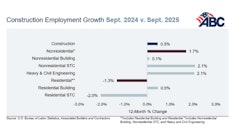
As with other industries, asphalt and pavement companies are not immune from challenges that compete for time and resources. Between supply chain shortages, the industry-wide push to go green, and the existing demands on the business, many are feeling the pressure to compete. Those pressure points are even more acute when it comes to the workforce challenges across this and other blue-collar industries. At the 2022 IGNITE Summit, our team heard from many industry leaders about the labor shortages they face, and some of the creative things they are doing to try to keep their staff.
One of the often-discussed outcomes of the COVID-19 pandemic was the impact to workforce that many industries still face today. The U.S. Chamber of Commerce reported in late 2021 that “Almost all (92%) contractors report some level of difficulty finding skilled workers, but this quarter, 55% indicate high levels of difficulty… This lack of workers is having an impact on contractors’ bottom lines.” In the same report, those contractors that reported struggling to find skilled labor had to turn down work, and experienced difficulty meeting project deadline requirements. And, because of the impact this is having on their bottom line, more than half have increased their bids for projects. We often tell clients who face these kinds of challenges that there are things they can do to keep their current workforce and bolster loyalty, and many employers are often doing these things already. This can include healthcare and retirement benefits, training and educational opportunities, and professional development, including performance review structures.
New Strategies for an Old Problem
Many are starting to push for blue collar jobs to receive some of these traditionally white-collar benefits. An example is professional development opportunities. Business Insider explains that companies should consider, “creating a pipeline that allows entry-level workers to gain skills and advance into harder-to-fill, specialized roles.” And while this may help keep the employees you do have, it is only part of a solution for filling your labor gaps.
An often forgotten or seemingly overwhelming fix to this workforce problem is immigration. In fact, there are various avenues for solutions based on business needs, especially if you have specialized needs that require education, and some solutions can lead to a more permanent workforce solution. The H-2B Visa is the most commonly utilized visa for companies in the asphalt and pavement industry. This is a non-agricultural, non-immigrant visa so there is a limit on how long these individuals can stay in the country. The length of stay in the United States varies based on the seasonal justification for the work.
Like other visa types for business-based immigration, there are various requirements for the employers, which is why it is valuable for employers to hire skilled immigration attorneys to ensure compliance. And, there are other things to consider with the H-2B Visa, such as the annual cap of 66,000 visas and the amount of time necessary to go through the application process. But for many, this can prove to be a great solution for companies who face seasonally fluctuating labor demands and are looking to try immigration for their business.
For more specialized and skilled labor, the TN Visa is an additional solution. Created through NAFTA, the TN Visa is a non-immigrant visa for certain qualified Canadian and Mexican citizens for professional roles. Both the job title and responsibilities, as well as the candidate, must fit within certain qualifications for specifically identified professions. One of the benefits of the TN Visa is that it allows for candidates to remain in the United States for up to three years with additional extensions available. This is critical for providing long-term employment for companies in need of specialized labor, ensuring your business can focus on business rather than spending time on hiring for positions that require professional qualifications.
As with the H-2B Visa, there are requirements for the employer to sponsor a TN candidate, so utilizing an experienced attorney is important to maintain compliance.
And, there are other options for more permanent solutions, such as the PERM (or EB-3). This employment-based visa allows for long-term employment opportunities in the United States. A candidates’ eligibility for the EB-3 is determined based on education, specialized skills, and relevant experience. There are three types of EB-3 Visas, all of which may be relevant for the asphalt and construction industry: Skilled, Professional, and Unskilled.
Each year, roughly 40,000 EB-3 green cards are issued. But similar to the H-2B Visa, there is an annual cap on the number of EB-3 green cards (140,000 per year). The process to apply for and be approved for this type of visa varies on a number of things, including visa availability, if the application is audited, among other reasons. As with other visa types and the application process, it is important to consult a skilled attorney to guide you through the process. PERMs can be a great solution for companies that do not have a seasonally fluctuating demand for labor, but face a perpetual labor shortage.
The process for any of these visas are often perceived as time consuming and costly, especially at first glance. But there are resources to help you determine the right course for your business and understand all the available options. You know first-hand that your workforce is one of your greatest assets, but if you keep trying the same recruitment tactics, you’ll likely end up with the same results. This labor shortage is expected to continue, and many have gone as far as to argue that the worker shortage in the U.S. may be an immigration shortage. The solution to your workforce problem may not be as simple as it once was, and the answer to growing your business could be via immigration.



















